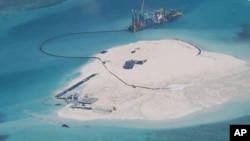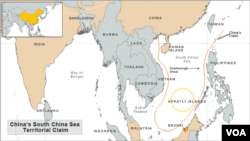The Philippines is expressing “serious concern” over newly released satellite images that show major progress in China’s reclamation work at contested outcroppings in the South China Sea.
The latest images published by IHS Jane’s Defense Weekly show “a large facility” in the works at Johnson South Reef. In May 2014, the Philippine military reported a Chinese construction ship was moving sand and rocks to augment the reef.
The latest images also show, from the start of construction at Gaven Reefs last March through this January, what appears to be a helipad and anti-aircraft tower. The report says the work at Gaven has “almost identical footprints” to the reclamation activities at nearby Hughes Reef, which is claimed by Vietnam.
Philippine Foreign Affairs Spokesman Charles Jose says the country is “seriously concerned” about China’s reclamation work.
“And we have noted that China’s construction [on] these features is plainly intended to change the character, the status and maritime entitlements of these features," he explained. "And we have strongly urged China to desist from the reclamation work that they’re doing.”
Manila has filed multiple protests with Beijing over China’s reclamation work at several outcroppings the Philippines claims among the Spratly Islands. Jose said China’s response to the last submitted Johnson South Reef protest was that it has indisputable sovereignty over the South China Sea’s islands.
This has been China’s position regarding any of its actions on or around the disputed rocks and banks. Furthermore, China’s Foreign Ministry has said the country has the right to engage in construction activities at its occupied islands. China, the Philippines, Vietnam, Brunei, Malaysia and Taiwan all have claims in the heavily traveled, resource-rich sea.
In the Spratlys, Vietnam and Taiwan have developed some smaller naturally formed islands with heavily fortified military infrastructure. Malaysia built a dive resort around a landing strip at one of its occupied outcroppings and the Philippines has pushed for civilian inhabitants on its largest island claims.
But Jane’s Defense Asia-Pacific editor James Hardy says China, which previously had not occupied any actual island there, is turning reefs into artificial islands. He says the features China is developing into islands “form a chain” across the Spratlys.
“But they’re still very capable and they’re going to be fortified and they’re going to basically give them a position to assert their sovereignty claims to the other bits of the Spratly Islands," he said. "That’s the issue. It’s all about coercion, really. I think that’s what we think is going to happen. They don’t necessarily have to start a war. They just have to make it very difficult for anyone else to be there.”
Photos from Jane’s and Philippine and Chinese government sources show China is so far creating artificial islands at Cuateron, Fiery Cross, Gaven, Hughes and Johnson South Reefs. Vietnam claims all of them, while the Philippines claims all but Hughes.








